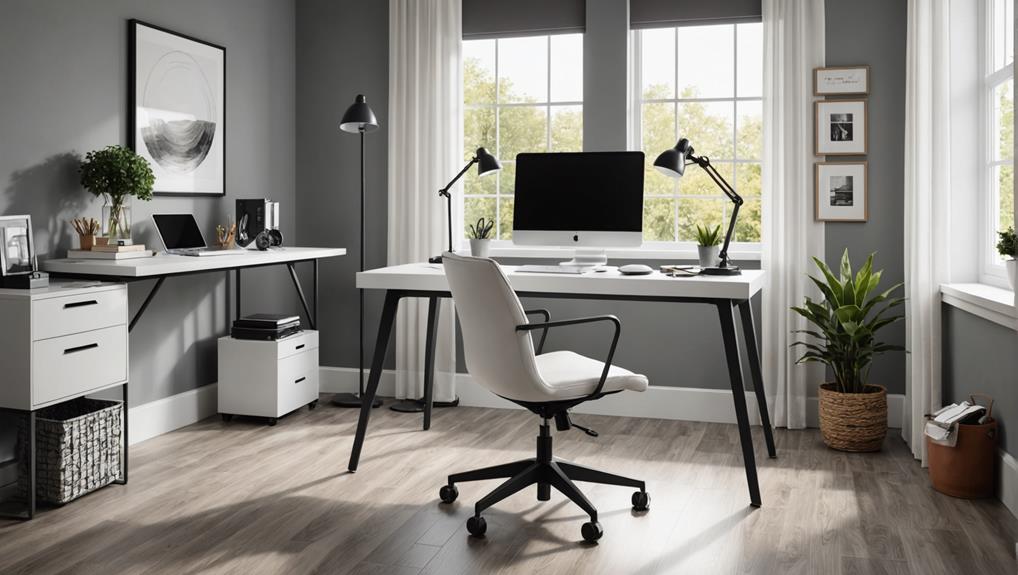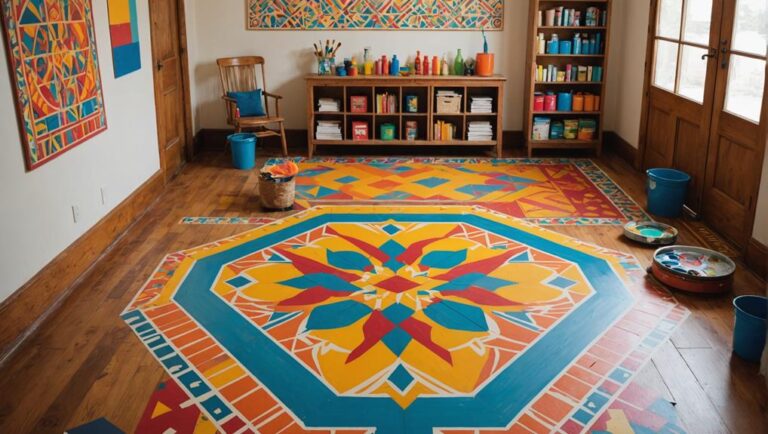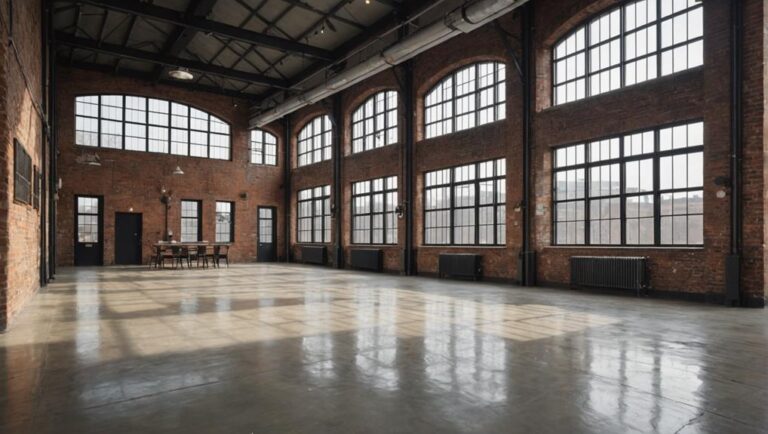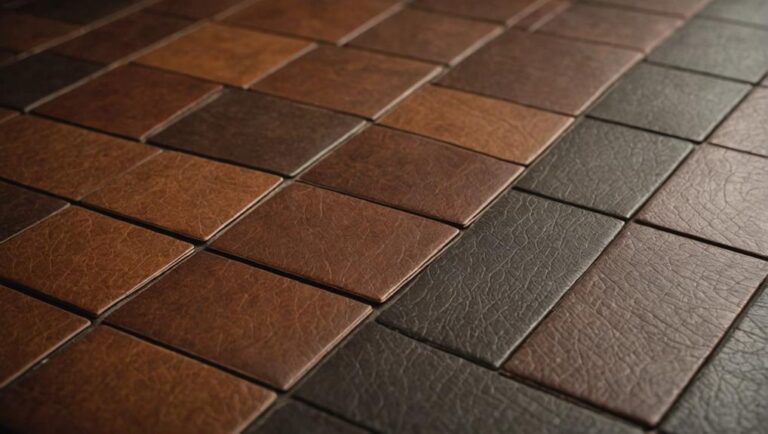When choosing easy-to-clean flooring for your home office, consider hard surfaces like vinyl, tile, or laminate. These materials are durable, scratch-resistant, and can handle heavy foot traffic. Vinyl is budget-friendly and mimics more expensive looks, while tile gives you a variety of designs and is naturally resistant to allergens. You might also think about maintaining a neat space with daily cleaning routines and using protective mats under furniture. With the right choice, you'll enjoy a stylish and functional workspace. If you want to explore more options and tips for maintaining your office flooring, there's plenty more to uncover.
Importance of Flooring Choice
When choosing flooring for your home office, it's important to take into account how often you'll be using the space. The right flooring can greatly impact not just the functionality of your office but also your productivity and comfort. You want a material that's durable and easy to maintain, especially if you're spending long hours working.
Aesthetic appeal is another vital factor to keep in mind. The flooring you choose should complement your overall office decor and create a welcoming atmosphere that inspires creativity and focus. From sleek hardwood to stylish carpets, you'll find options that enhance your workspace's look while serving practical purposes.
Additionally, noise reduction is something you shouldn't overlook. If your home office is in a high-traffic area or near noisy living spaces, selecting flooring that minimizes sound transmission can help you concentrate better. Carpeting, for instance, absorbs sound and can create a quieter environment, while certain underlays for hard surfaces can also provide some sound dampening.
Hard Surface Flooring Options
Hard surface flooring options offer a sleek and modern look that can elevate your home office's aesthetic while providing practical benefits. Choosing the right type of flooring can enhance your workspace's functionality and safety. Here are three popular hard surface options to evaluate:
- Hardwood: The hardwood benefits go beyond aesthetics. It's durable, easy to clean, and provides a warm, inviting atmosphere. Plus, it can improve indoor air quality, making your workspace healthier.
- Laminate: Known for its laminate durability, this flooring is a fantastic choice for busy home offices. It mimics the look of wood or stone but offers increased resistance to scratches and moisture. This means you won't have to worry about spills or heavy foot traffic damaging your floors.
- Vinyl: Modern vinyl flooring is surprisingly stylish and incredibly resilient. It's waterproof and can withstand the wear and tear of a bustling office environment. With endless design options, you can find something that suits your style while ensuring safety with slip-resistant options.
When selecting hard surface flooring, think about your office's overall vibe, how much traffic it sees, and your cleaning preferences. With the right choice, you can create a beautiful, functional workspace that supports your productivity and safety needs.
Carpet Alternatives for Offices
If you're looking for carpet alternatives for your home office, hard surface options like laminate or hardwood can provide a sleek, professional look. You might also consider area rugs, which can add warmth and comfort without the commitment of wall-to-wall carpeting. Plus, vinyl flooring offers durability and easy maintenance, making it a practical choice for your workspace.
Hard Surface Options
Choosing the right flooring for your home office can greatly impact both aesthetics and functionality. If you're considering hard surface options as an alternative to carpet, you've got some excellent choices that are easy to clean and maintain. Here are three top contenders:
- Laminate Flooring: Known for its laminate durability, this option mimics the look of hardwood without all the upkeep. It's resistant to scratches and stains, making it a practical choice for a busy workspace.
- Vinyl Plank Flooring: This versatile option combines comfort with durability. It's waterproof and can withstand spills, which is essential in a home office environment. Plus, it comes in various styles, including those that resemble hardwood aesthetics.
- Tile Flooring: If you're looking for something even more robust, tile is a fantastic option. It's easy to clean and can handle heavy foot traffic, ensuring that your workspace remains safe and tidy.
Area Rugs Benefits
While hard surface options provide durability and easy maintenance, area rugs can offer a cozy and inviting touch to your home office. They not only enhance the aesthetics of your space but also add comfort underfoot. The right area rug can help reduce noise, making your workspace quieter and more conducive to productivity. Plus, they come in various styles and materials, allowing you to personalize your area to match your taste.
Here's a quick comparison of common area rug styles and materials:
| Style | Material | Benefits |
|---|---|---|
| Traditional | Wool | Durable, soft, and stain-resistant |
| Modern | Synthetic Fiber | Affordable, easy to clean |
| Shag | Cotton | Soft, cozy feel |
| Outdoor | Polypropylene | Weather-resistant, easy maintenance |
When selecting an area rug, consider the safety aspects too. Look for non-slip backing to prevent accidents, especially on hard floors. Choosing the right area rug can transform your home office into a warm, inviting environment while providing safety and comfort.
Vinyl Flooring Advantages
Vinyl flooring stands out as a practical choice for home offices, offering a blend of durability and comfort that carpet often struggles to provide. If you're pondering a flooring option that's both functional and visually appealing, vinyl might be your best bet. Here are three key advantages to contemplate:
- Vinyl Durability: Known for its resilience, vinyl can withstand heavy foot traffic, making it ideal for busy workspaces. You won't have to worry about scuffs or stains ruining your floor.
- Vinyl Aesthetics: With a wide range of styles and designs, vinyl can mimic the look of hardwood or stone, giving your office a polished appearance without the hefty price tag.
- Easy Maintenance: Unlike carpet, which can trap dust and allergens, vinyl flooring is much simpler to clean. A quick sweep and a mop are usually all you need to keep your workspace tidy.
Choosing vinyl flooring means prioritizing a safe, hygienic, and attractive environment for your home office. Its combination of vinyl durability and vinyl aesthetics makes it an excellent choice for creating a productive workspace.
Benefits of Vinyl Flooring
Considering the demands of a home office, opting for vinyl flooring can be a smart choice. This type of flooring offers exceptional vinyl durability, making it ideal for high-traffic areas where you spend long hours working. Unlike other flooring options, vinyl can withstand spills, scratches, and everyday wear and tear, ensuring that your workspace remains functional and attractive for years to come.
One of the standout benefits of vinyl flooring is its easy maintenance. You won't have to worry about complicated cleaning routines; a quick sweep and mop are often all it takes to keep your space looking pristine. For those concerned about safety, vinyl flooring is slip-resistant, reducing the risk of accidents—a vital factor when you're focused on your work.
Vinyl aesthetics also play a significant role in your home office environment. With a vast array of colors, patterns, and textures, you can easily find a style that complements your decor. Whether you prefer a modern look or something more traditional, there's a vinyl option that can enhance your workspace's overall appeal.
Additionally, vinyl is often more budget-friendly than other flooring materials, allowing you to invest in other essential office equipment. When you combine affordability with durability and aesthetic appeal, it's clear why vinyl flooring is an excellent choice for creating a productive, safe, and visually pleasing home office.
Tile Flooring Advantages
If you're exploring other flooring options for your home office, tile flooring comes with its own set of advantages that can be quite appealing. First and foremost, tile durability is a standout feature. Unlike other materials, tiles can withstand heavy furniture and everyday wear and tear, making them a smart choice for a space you use regularly.
Additionally, tile flooring offers remarkable aesthetic appeal. With a wide variety of colors, patterns, and textures, you can easily find the perfect match that complements your office's decor. Imagine how your workspace could transform with:
- Stylish ceramic tiles that mimic the look of natural stone, bringing elegance to your office.
- Glossy porcelain tiles that reflect light, creating an illusion of a more spacious environment.
- Textured tiles that add depth and visual interest, making your workspace more inviting.
Another significant advantage of tile flooring is its safety features. Tiles are often slip-resistant, providing a stable surface to walk on, which is essential for preventing accidents, especially if you have children or pets at home. Plus, they're naturally resistant to allergens like dust and mold, promoting a healthier work environment.
Maintenance Tips for Home Offices
Maintaining your home office flooring is key to keeping it looking great and lasting longer. You'll want to establish a daily cleaning routine, know how to tackle any stains that come up, and implement long-term care practices. With the right approach, you can guarantee your workspace stays fresh and inviting.
Daily Cleaning Routine
A daily cleaning routine is essential for keeping your home office organized and conducive to productivity. By incorporating simple daily habits, you can maintain a safe and tidy workspace. Here are three key tasks to include in your routine:
- Wipe Down Surfaces: Use effective cleaning products to regularly wipe down your desk, keyboard, and phone. This not only removes dust and allergens but also helps prevent the spread of germs.
- Organize Clutter: Spend a few minutes each day putting away papers, supplies, and any miscellaneous items. A clutter-free environment boosts your focus and reduces stress.
- Vacuum or Sweep: Depending on your flooring type, a quick vacuum or sweep can keep dirt and debris at bay. This daily habit helps maintain a clean floor, ensuring that your workspace feels fresh and inviting.
Stain Removal Techniques
Accidents happen, and when they do, knowing how to tackle stains quickly can save your home office from looking less than professional. Start by employing some simple stain prevention methods, like using coasters for drinks and keeping food away from your work area. This can help minimize the risk of spills.
When a stain does occur, act fast. Blot the stain gently with a clean cloth to absorb as much liquid as possible—don't rub, as that can make things worse. Depending on the type of stain, you'll need the right effective cleaning solutions. For water-based stains, mix a solution of mild dish soap and water, then apply it with a soft cloth. For tougher stains, consider using a mixture of vinegar and water.
Always test your cleaning solution on an inconspicuous area first to verify it won't damage the flooring. If you're dealing with oil-based stains, use a specialized cleaner designed for your specific flooring type. Remember, the key to successful stain removal lies in your quick response and the right cleaning approach. By mastering these techniques, you can keep your home office looking sharp and professional.
Long-Term Care Practices
While it might be easy to overlook the upkeep of your home office flooring amidst your busy schedule, consistent care is vital for preserving its appearance and longevity. Not only does regular maintenance enhance the aesthetic appeal, but it also guarantees a safe working environment, especially under budget constraints. Here are three simple practices you can implement:
- Regular Cleaning: Sweep or vacuum frequently to remove dirt and debris. This helps prevent scratches and maintains your flooring's finish.
- Use Natural Cleaners: When mopping or cleaning, choose eco-friendly products that align with sustainability considerations. This protects both your flooring and the environment.
- Protective Mats: Place mats under desks and office chairs to minimize wear and tear. This is an easy way to extend the life of your flooring without breaking the bank.
Final Thoughts on Flooring Selection
Choosing the right flooring for your home office can greatly impact both your productivity and comfort. When making your decision, you'll want to evaluate various factors, including ease of cleaning, safety, and your unique aesthetic preferences. Opting for easy-to-clean materials not only helps maintain a tidy workspace but also contributes to a healthier environment, reducing allergens and dust buildup.
Incorporating sustainability considerations into your flooring selection is essential. Look for options made from eco-friendly materials, such as bamboo or reclaimed wood. These choices not only align with your values but can also enhance the ambiance of your office. Remember, a well-chosen floor can inspire creativity and focus, so don't underestimate the influence of aesthetics on your work atmosphere.
Safety is another critical aspect. You'll want flooring that minimizes the risk of slips and falls, especially if you plan to have a busy workspace. Textured surfaces or non-slip finishes can provide extra security. Additionally, reflect on the comfort of standing or walking on the surface for extended periods. Options like cushioned vinyl or cork can offer both style and support.
Ultimately, your flooring should reflect your personal style while meeting practical needs. By balancing sustainability considerations with aesthetic preferences, you'll create a space that's not only visually appealing but also functional and safe. Take your time in selecting the right flooring—it's an investment in your productivity and well-being.
Frequently Asked Questions
What Flooring Is Best for Reducing Noise in Home Offices?
Imagine a serene library, where whispers float like gentle breezes. To create that peaceful haven in your home office, consider soundproof carpets or acoustic tiles. These materials absorb noise, keeping distractions at bay. Soundproof carpets cushion footsteps and reduce echoes, while acoustic tiles can be strategically placed to further dampen sound. By choosing these options, you'll not only enhance your focus but also cultivate a calming environment that promotes safety and productivity.
Are There Eco-Friendly Flooring Options for Home Offices?
Absolutely, there are plenty of eco-friendly flooring options for your home office! Consider sustainable materials like bamboo or cork, which are both stylish and environmentally friendly. For maintenance tips, use natural cleaners to keep your floors looking great without harmful chemicals. Avoid carpets if you're concerned about allergens; instead, opt for low-VOC laminate or vinyl. These choices not only contribute to a healthier space but also show your commitment to sustainability.
How Do Different Flooring Materials Affect Indoor Air Quality?
Different flooring materials can greatly affect indoor air quality. For instance, carpets can trap dust and allergens, while hard surfaces like tile or laminate are easier to clean and less likely to harbor pollutants. You'll want to take into account low-VOC options, as they emit fewer harmful chemicals. Choosing the right flooring not only enhances your space aesthetically but also promotes a healthier environment, ensuring you breathe easier and feel safer at home.
Can I Install Flooring Myself, or Should I Hire a Professional?
Imagine standing at a crossroads, one path leading to DIY installation, the other to professional services. If you're handy and enjoy projects, taking the DIY route can be rewarding. However, if you're unsure, hiring a pro guarantees safety and a polished finish. Consider your skill level, tools, and time available. It's vital to weigh the benefits of your expertise against the peace of mind a professional brings to your flooring installation.
What Is the Cost Difference Between Various Easy-To-Clean Flooring Types?
When considering easy-to-clean flooring, it's essential to do a cost comparison. Vinyl tends to be more affordable upfront, while hardwood may have higher initial costs but offers greater longevity, making it a smart investment. Laminate falls in between, providing a balance of price and durability. Remember, cheaper options might require more frequent replacement, impacting long-term safety and maintenance. Assess your budget and needs carefully to choose the right flooring for you.




